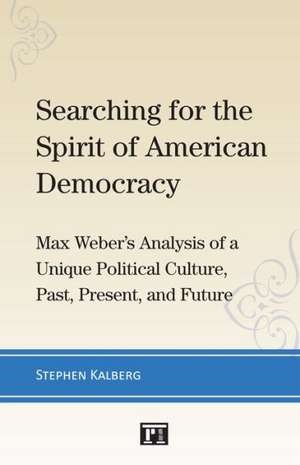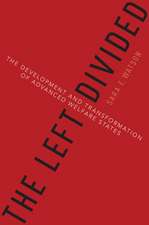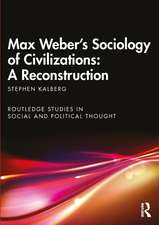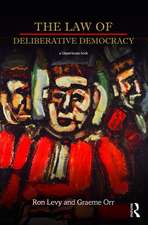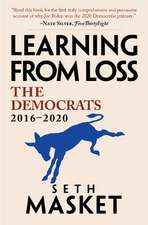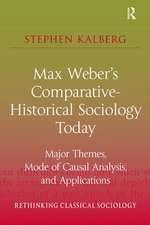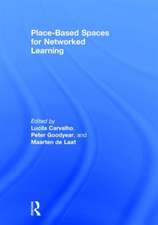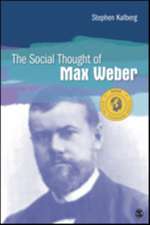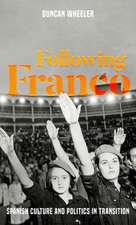Searching for the Spirit of American Democracy: Max Weber's Analysis of a Unique Political Culture, Past, Present, and Future
Autor Stephen Kalbergen Limba Engleză Paperback – 30 sep 2014
| Toate formatele și edițiile | Preț | Express |
|---|---|---|
| Paperback (1) | 345.89 lei 6-8 săpt. | |
| Taylor & Francis – 30 sep 2014 | 345.89 lei 6-8 săpt. | |
| Hardback (1) | 1267.99 lei 6-8 săpt. | |
| Taylor & Francis – 14 noi 2013 | 1267.99 lei 6-8 săpt. |
Preț: 345.89 lei
Nou
Puncte Express: 519
Preț estimativ în valută:
66.21€ • 71.94$ • 55.65£
66.21€ • 71.94$ • 55.65£
Carte tipărită la comandă
Livrare economică 21 aprilie-05 mai
Preluare comenzi: 021 569.72.76
Specificații
ISBN-13: 9781612054452
ISBN-10: 1612054455
Pagini: 176
Dimensiuni: 138 x 216 x 9 mm
Greutate: 0.2 kg
Ediția:1
Editura: Taylor & Francis
Colecția Routledge
Locul publicării:Oxford, United Kingdom
ISBN-10: 1612054455
Pagini: 176
Dimensiuni: 138 x 216 x 9 mm
Greutate: 0.2 kg
Ediția:1
Editura: Taylor & Francis
Colecția Routledge
Locul publicării:Oxford, United Kingdom
Recenzii
“In sum, Kalberg accomplishes a rare feat: to infuse a long-standing and seemingly stale debate on the content of Weber’s thought and its merits with startling new insights that show how, in novel ways, to bring back to life the ideas of a man who died almost 100 years ago…Weberians and non-Weberians alike, take notice.”
—American Journal of Sociology
"In this gem of a book Stephen Kalberg relies on Max Weber to unravel the historical roots of American political culture. The spirit of American democracy has been marked by a pendulum swinging between the poles of self-reliance and civic engagement. This concise and weighty book offers insight and illumination as we ponder whether polarization is all that is left when the pendulum stops moving."
—Peter J. Katzenstein, Walter S. Carpenter, Jr. Professor of International Studies, Cornell University
In a gestalt switch from the usual application of Weber's Protestant Ethic to capitalist development, Kalberg shows how it explains American politics. It could well be titled "The Protestant Ethic and the Spirit of Democracy." Ascetic Protestants work out their salvation in America not just in an individual work ethic but by actively participating in a civic sphere of good will, egalitarianism, and public responsibility. Then ensues an historic drama: value-motivated carriers transport the spirit of democracy across the generations, but buffeted by growing forces of self-propelling capitalism and bureaucracy. As the civic sphere is undermined, American individualism turns into private channels of practical and personal concerns. Skeptical that the unique American pathway to the spirit of democracy can be generalized elsewhere in the world, nevertheless Kalberg finds the moral concerns of American politics still alive in recent elections. A book of political-historical sophistication exemplary of the spirit of Weber himself.
—Randall Collins, Dorothy Swaine Thomas Professor of Sociology, University of Pennsylvania
“Stephen Kalberg has developed a beautifully relevant Weberian analysis of the conflicted trajectory of contemporary American society. He accomplishes this with a concise text that nevertheless leaves nothing out, except the tedium of scholasticism. Kalberg is especially luminous in his treatment of the translation of the ethical individualism into a secular creed sustained by the densely populated world of politically interested civic organizations, his exploration of the ways this morally animated civil society has been a force against the iron cage of an increasingly bureaucratized political economy, and his sensitive analysis of why the reproduction of this civilizing force is fragile and problematic in the twenty-first century.”
—Michael Schwartz, Stony Brook University
"One of today's leading Weberian scholars mines Max Weber's theoretical work and his mode of analysis in highly creative ways to shed new light on America's political culture and its raging political crises. A strong political culture is shown to have existed in the United States, but its continued viability is not guaranteed. Stephen Kalberg has created a model of how to use a rigorous classical social theory to create a new and deeper understanding of political culture, its crises and the contemporary world more generally.
—George Ritzer, Distinguished University Professor, University of Maryland
—American Journal of Sociology
"In this gem of a book Stephen Kalberg relies on Max Weber to unravel the historical roots of American political culture. The spirit of American democracy has been marked by a pendulum swinging between the poles of self-reliance and civic engagement. This concise and weighty book offers insight and illumination as we ponder whether polarization is all that is left when the pendulum stops moving."
—Peter J. Katzenstein, Walter S. Carpenter, Jr. Professor of International Studies, Cornell University
In a gestalt switch from the usual application of Weber's Protestant Ethic to capitalist development, Kalberg shows how it explains American politics. It could well be titled "The Protestant Ethic and the Spirit of Democracy." Ascetic Protestants work out their salvation in America not just in an individual work ethic but by actively participating in a civic sphere of good will, egalitarianism, and public responsibility. Then ensues an historic drama: value-motivated carriers transport the spirit of democracy across the generations, but buffeted by growing forces of self-propelling capitalism and bureaucracy. As the civic sphere is undermined, American individualism turns into private channels of practical and personal concerns. Skeptical that the unique American pathway to the spirit of democracy can be generalized elsewhere in the world, nevertheless Kalberg finds the moral concerns of American politics still alive in recent elections. A book of political-historical sophistication exemplary of the spirit of Weber himself.
—Randall Collins, Dorothy Swaine Thomas Professor of Sociology, University of Pennsylvania
“Stephen Kalberg has developed a beautifully relevant Weberian analysis of the conflicted trajectory of contemporary American society. He accomplishes this with a concise text that nevertheless leaves nothing out, except the tedium of scholasticism. Kalberg is especially luminous in his treatment of the translation of the ethical individualism into a secular creed sustained by the densely populated world of politically interested civic organizations, his exploration of the ways this morally animated civil society has been a force against the iron cage of an increasingly bureaucratized political economy, and his sensitive analysis of why the reproduction of this civilizing force is fragile and problematic in the twenty-first century.”
—Michael Schwartz, Stony Brook University
"One of today's leading Weberian scholars mines Max Weber's theoretical work and his mode of analysis in highly creative ways to shed new light on America's political culture and its raging political crises. A strong political culture is shown to have existed in the United States, but its continued viability is not guaranteed. Stephen Kalberg has created a model of how to use a rigorous classical social theory to create a new and deeper understanding of political culture, its crises and the contemporary world more generally.
—George Ritzer, Distinguished University Professor, University of Maryland
Cuprins
Introduction; Chapter One The Foundations I; Chapter Two The Foundations II; Chapter Three The “Eminent Power” of the American Political Culture to Form Groups; Chapter Four The Political Culture of the Late Nineteenth and Early Twentieth Centuries; Chapter Five The Weberian Model; Chapter Six Complementary Models; Chapter Seven Conclusion;
Descriere
Rich new insights into the particular contours of today's American political culture, based on Max Weber's insights.
